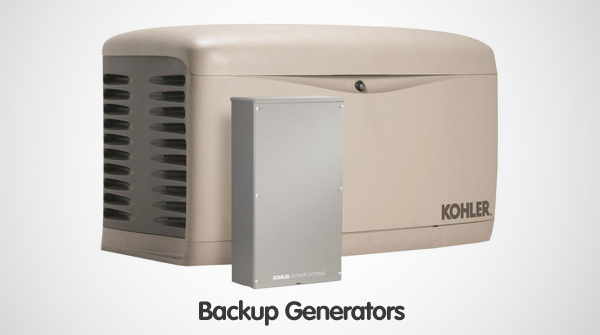Backup Generators

* This site contains affiliate links for which we may be compensated.
Backup generators are power sources that operate automatically within minutes of electricity outages. They deliver power directly to the electrical system of your home; providing your entire property, or vital items on your property, with power. Some backup generators run on existing gas, so there is no need to refill.
Do I Need A Backup Generator?
Power outages can be unpredictable and a real pain if you don’t have an alternative power source. At the very least, an unexpected power outage impedes the operation of refrigerators, air conditioning, lighting, water pumps, and heating systems in your home. Lengthy power outages can cause pipes to become frozen in winter and your freezer may thaw and flood your home. Anyone can find themselves in these situations and with backup generators you can avoid costly repairs.
Backup Generators Hazard and Safety Tips
– Familiarize yourself with the manufacturer’s guide for the generator you purchase to ensure that you understand how it operates.
– Ensure that you have a properly functioning fire extinguisher close by.
– Adhere to national electric and fire codes.
– Install a carbon monoxide alarm in your home.
– Never refuel your generator while it is still in operation.
– Position the generator so that exhaust fumes cannot affect residents on the property.
– Have an expert inspect your generator regularly for possible defects.
– Try using low watt light bulbs in your home to reserve power for appliances and lighting elsewhere.
– Double check to ensure that the electric load on your generator does not exceed the manufacturer’s – requirements.
– Avoid smoking close to generator
– Never overfill the fuel tank on your generator.
– Use safe power cords and keep them out of walkways to avoid tripping hazards.
– Ensure that generators or connected properly to avoid fire hazards.
Buying Guide and Tips
You will have to do some proper calculations and speak to an expert when you decide to purchase a backup generator. To sum it all up, the generator you purchase should have a wattage slightly higher than what is required to power the items on your property. You can check the labels on your appliances for the required wattage. Consult an expert who can advise you accordingly and you can also try a power selection tool.
Aside from your power needs, consider your budget and choose a generator of higher convenience. Consider the cost to hire an electrician and possible maintenance charges as well.
Backup generators are a great way to direct power to the circuits of your home so that you can enjoy optimum comfort during a power outage. During extremely hot or cold climates, generators are efficient at providing comfort and safety. With a backup generator your property will not become a victim of looting. The information covered in this post provides a general idea of what your need to know when you decide to purchase a backup generator for residential or commercial usage.







